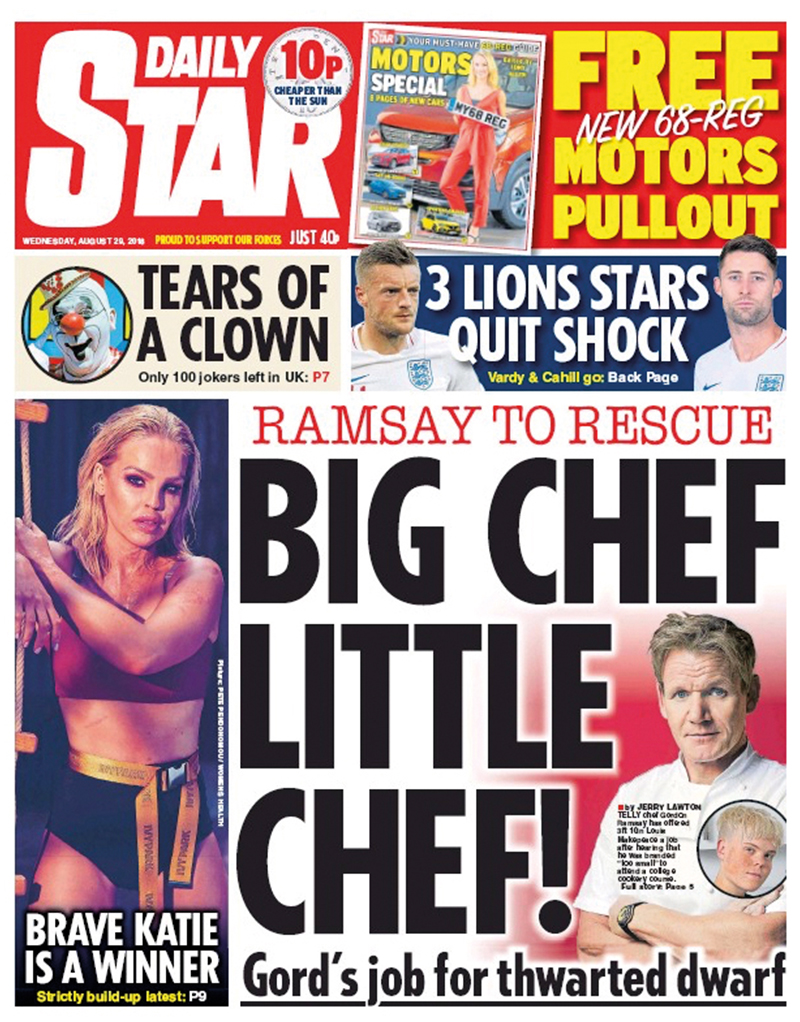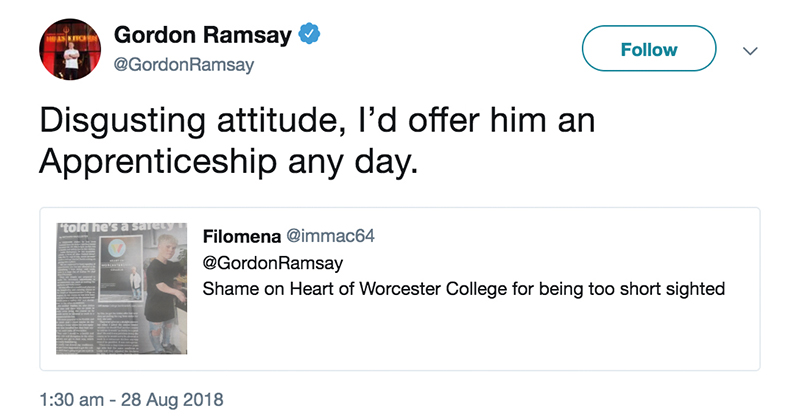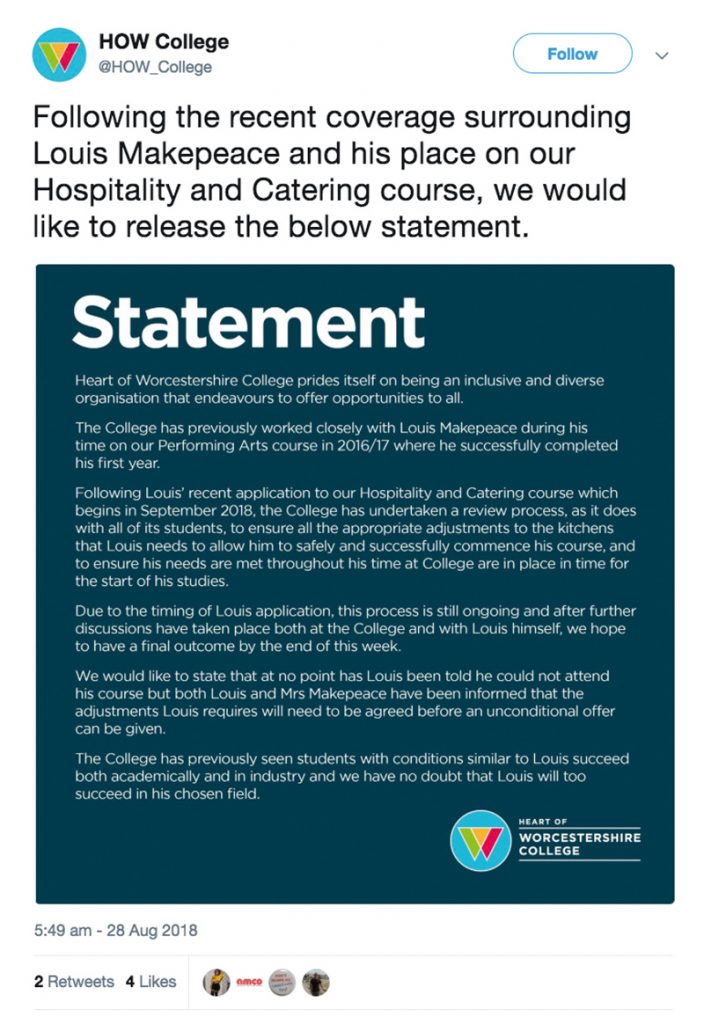Colleges hit the headlines this summer – but for all the wrong reasons.
Louis Makepeace, an 18-year-old with dwarfism, claimed to have been rejected for a catering course at Heart of Worcestershire College because his height would make him a health and safety risk.
His story was reported nationally, prompting criticism of the college and the way it handled the situation.
We outline what happened – and offer advice for other colleges that might find themselves in a similar media storm.

In the space of less than a month, 18-year-old Louis Makepeace has been catapulted from wannabe chef to working in the kitchen of a Michelin-starred restaurant, with an apprenticeship with Gordon Ramsay on offer – and the subject of a Channel Five documentary.
Just how did this happen?
The saga started on August 16, when Louis went for a one-on-one interview with the course leader of the level one introduction to professional cookery course at Heart of Worcestershire College.
“The first thing he told me in the interview room was that I’d never get any future employment if I wanted to be a chef. There was no point in me going to the college and learning the trade,” Louis alleged.
He said he asked about having a kitchen adapted to his needs, but was told “it would be far too much work to put in” and “it would disrupt the other students”.
“I said, well, can’t I just use a stool in the meantime? And he said it’d be a health and safety risk to have a stool in the kitchen,” Louis told FE Week.
The college interview left him “heartbroken”.
“I’d never been discriminated against like that before – I didn’t even think that was acceptable.
“This is my education they’re ruining. I want to be a chef, and they’re stopping me from getting a chance a train,” Louis told FE Week last month.
He said he’d been told by the course leader that he had a conditional offer of a place, subject to a health and safety check.
But he claimed he never heard back from the college – and when his mother chased it up a few days later she was told by the course leader that Louis should look for another course.
However, the college has refuted Louis’ version of events [see below].
The apparent rejection prompted the pair to go to the newspapers, with his story featuring on the BBC, Daily Mail, the Sun and the Daily Star, and on ITV’s This Morning show on August 29, among others.
Celebrity chef Gordon Ramsay even muscled in on the action, with a tweet that he would “offer him an apprenticeship any day”.

That wasn’t the only apprenticeship on offer, with Michelin-starred restaurant Pied-a-Terre also inviting him to train with them.
Meanwhile, the college still hadn’t said whether it would be able to offer Louis a place.
He told FE Week on August 30 he’d been treated “appallingly” by the college, and wouldn’t accept a place even if it was offered to him.
“I think it’s outrageous the way they’ve treated me, making me wait so long just to get an answer if I could be in their kitchen or not. It’s just disgraceful,” he said.
Earlier this month the college confirmed that Louis had told it he no longer wished to study there.
“We wish Louis the best of luck with his future career,” a spokesperson said.
Louis has yet to decide exactly what his next move will be, describing the interest in his future as “overwhelming”.
He told FE Week this week that he’d been for a training day with Pied-a-Terre in London, working alongside its head chef in the heat of the kitchen.
He used a stool – the very thing the college had said would be a health and safety risk.
“It was a busy kitchen with other chefs around me, and they adapted very smoothly,” he said, with “no collisions, no hazards”.
“I worked in the busiest part of the kitchen, too, so it proved a point.”
Even though I’ve been knocked back from the college I’ve been able to turn that into a positive
He has one more training day at the restaurant, when he will be preparing canapes for a food festival. After this shift he expects to be told if they want to take him on or not.
Regardless of the outcome, Louis is upbeat about the experience: “I’ve definitely had a very good time working in the restaurant. Even if they don’t ask me back, I’ve done it and I’ve learned from it.”
As for Gordon Ramsay’s apprenticeship offer, Louis said that talks with the celebrity chef’s agent haven’t moved forward, although he hasn’t yet ruled it out.
Another unexpected outcome from the media frenzy is that Louis will star in a Channel Five documentary focusing on “people with restricted growth trying to create a career for themselves”.
It’s being filmed at the moment, and is expected to air some time in 2019.
“I feel it’s really important for me to show that even though I’ve been knocked back from the college I’ve been able to turn that into a positive and carry on trying to gain as much experience as I can and to create a career,” he said.
If the offers from Pied a Terre and Gordon Ramsay don’t work out, Louis has his sights set on doing an apprenticeship elsewhere “working in the kitchen alongside real chefs”.
He wouldn’t go back to college because “I think it’ll set me back”.
“I’ve got so many opportunities and I don’t really want to be wasting time in a college environment.”

The college’s side of the story
When Louis first hit the headlines, the story was told entirely from his perspective.
According to the first articles published on August 27, the college said “we do not wish to make a comment” as “the student’s place is still under discussion”.
It was only the following day, August 28, when the college belatedly tweeted a statement refuting the allegations.
That statement said it was carrying out a “review process” to “ensure all the appropriate adjustments to the kitchens that Louis needs to allow him to safely and successfully commence his course” and to meet his needs throughout his course were “in place in time for the start of his studies”.
“We would like to state that at no point has Louis been told he could not attend his course but both Louis and Mrs Makepeace have been informed that the adjustments Louis requires will need to be agreed before an unconditional offer can be given.”
It also told FE Week that the course leader had not made the comments that Louis and his mother alleged he had made.
The college had attempted to make contact with Louis’ mother but had been unable to speak to her and she had not responded to messages asking her to make contact, a spokesperson said.
But by the time the college responded to the allegations it was too late.
Following the widespread coverage of Louis’ story, the college was condemned on social media for its treatment of the teenager.
And tweets by Gordon Ramsay and Warwick Davis, an actor and TV presenter who also has a form of dwarfism, helped stoke that outrage.
“This is so sad,” Warwick Davis tweeted.
“In a world that is supposed to promote diversity, equality and inclusion, Louis Makepeace has the right to access this cooking course with the proper adaptations and the college has a duty to provide.”
FE Week asked the college if it wanted to comment on the media coverage of Louis’ story and how it handled the situation, but it declined to do so.
‘Nine times out of 10 you should comment’
Ruth Sparkes is managing director of EMPRA, an award-winning specialist education sector PR and communications agency.
She offers her advice to colleges what to do if – like Heart of Worcestershire College – they find themselves at the centre of a media storm.
“Being called by a journalist out of the blue to corroborate a negative story is always difficult,” she said.
But the best thing to do in most situations is “get as much information as possible” and then “put together a response”.
If the information the college is being asked to comment on has come from someone willing to be named “then the story will run and nine times out of 10 you should comment”.
“Remember, journalists have a job to do, and if you don’t engage with them, they may well run with commentary from anyone who appears to be in the know or even moderately informed, however inaccurate they turn out to be.”
What to ask the journalist
Get as much information as you can from the journalist, Ms Sparkes advised. Ask them what the story is, where it has come from, what proof they have of what you’re being asked to comment on, and if anyone else has been asked to comment.
Ask the journalist to send you a list of their questions. You don’t have to answer all of them, but it can be helpful to see them as it can give you a clue on the line they’re hoping to take.
And be clear on their absolute deadline.
What to do
Find out what actually happened, who was involved, who was consulted and what the current state of play is, Ms Sparkes said.
What to share
Your statement should be short and clear, without using waffle or ‘eduspeak’, Ms Sparkes advised.
It must highlight that you understand and accept the situation, and apologise if appropriate – although you may need to take legal advice here depending on the issue.
It should show there is a positive journey ahead – that you’ve learned lessons, implemented training or engaged an expert external organisation to ensure this sort of thing won’t happen again.
What to expect
If the story has the potential to be picked up nationally, Ms Sparkes said colleges should plan for the worst.
One clear indicator that a story is going to go national is if the journalist works for a news agency rather than a local paper.
If it’s a local journalist but they work with a news agency, or the local paper is part of a large newspaper group, there’s a high chance the story will be syndicated.
Monitoring social media in these circumstances is important, Ms Sparkes said. She advised colleges to keep an eye on readers’ comments or the social media sites for the papers that have covered the story, and to respond where appropriate.
If the story is covered on the TV or radio, you should only put forward a spokesperson that has had media training.
Make sure they know the college’s public statement and key message – and give them practice answering the most horrible questions you can think of.
What else?
Colleges will need to think about their learners, parents, staff, feeder schools and wider community: what do you need to tell them, and how?
The college website and social media channels can be useful for this, Ms Sparkes said, but they should be monitored and any comments or questions responded to if appropriate.
Think about whether anyone else needs to know what’s happening before publication, for example the chair of governors, student union president or relevant MPs.
What is the college legally required to do?
Colleges, like other education providers, are covered by the Equality Act 2010, which means they can’t discriminate against disabled learners.
They’re also required to put in place ‘reasonable adjustments’ so that disabled learners are able to access the same standard of education as other learners.
“Everyone must have the opportunity to reach their potential through education and education providers must make reasonable adjustments to ensure disabled students are not discriminated against or treated unfairly,” a spokesperson for the Equality and Human Rights Commission said.
This duty applies to the college’s policies, procedures and activities. It also applies to physical features including entrances, exits, toilets, lights, flooring and furniture, and to any auxiliary aids such as supportive equipment or staff.
Examples of reasonable adjustments include giving a learner more time to complete an exam if their disability causes them to write more slowly, or providing a sign language interpreter for deaf students.
Everyone must have the opportunity to reach their potential through education
There are a number of factors that colleges and other education providers can take into account when deciding if a particular adjustment is reasonable, including its cost and practicability.
In Louis’ case, the course leader allegedly said that he would present a health and safety risk to the other students.
According to the EHRC, health and safety is a “relevant factor to take into account when assessing the needs of a disabled student” but it “must not be used inappropriately to avoid making reasonable adjustments to accommodate their needs”.
Guidance published by the EHRC in 2015 on reasonable adjustments for pupils says “there might be instances in which, although an adjustment could be made, it would not be reasonable to do so because it would endanger the health and safety either of the disabled pupil or of other people”.
However, “health and safety issues must not be used inappropriately to avoid making a reasonable adjustment”.
The Ofsted inspection handbook states colleges will be judged on how well they “prepare learners who have special educational needs and/or disabilities to become more independent in their everyday life”.








Your thoughts